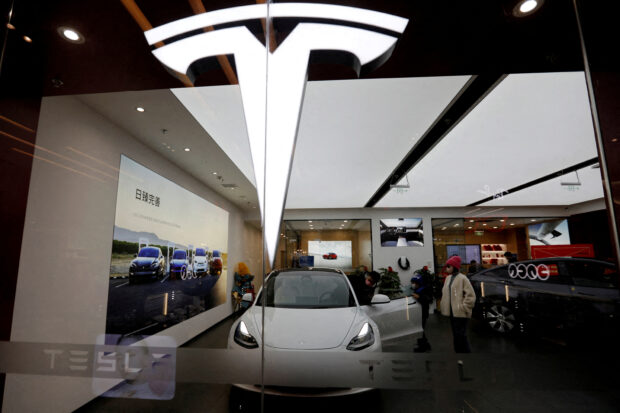
Visitors check a Tesla Model 3 car next to a Model Y displayed at a showroom of the U.S. electric vehicle (EV) maker in Beijing, China Feb 4, 2023. REUTERS/Florence Lo/File photo
Tesla on Tuesday posted a decline in quarterly deliveries for the first time in nearly four years and missed Wall Street estimates, a performance some described as “ugly” as price cuts failed to stir demand in a highly competitive market.
Shares of the Elon Musk-led company were down 5.2 percent at $166.08 on Tuesday afternoon, losing about $30 billion in market value. The shares have fallen about 33 percent so far this year.
After years of rapid sales growth that helped turn Tesla into the world’s most valuable automaker, the company is bracing for a slowdown in 2024.
The EV maker has been slow to refresh its aging models as high interest rates have sapped consumer appetite for big-ticket items and rivals in China, the world’s largest auto market, are rolling out cheaper models.
Tesla’s deliveries declined by 8.5 percent in the first quarter to 386,810 vehicles from a year ago and the company produced 433,371 vehicles during the period. Wall Street had expected Tesla to deliver 454,200 vehicles, according to the average projection of 18 analysts polled by Visible Alpha.
The last time the automaker posted a sales fall was in the second quarter of 2020 when the COVID-19 pandemic forced Tesla to shut down production.
Price cuts failed to stir demand
Tesla attributed the drop in volumes partly to efforts to prepare its Fremont, California factory to handle increased production of the updated Model 3 and to shutdowns at its Berlin plant due to the impact of the Red Sea conflict and an arson attack.
But Tesla produced 46,000 more vehicles than it sold in the first quarter, signaling softer demand, analysts said.
The vehicle inventory “confirms that beyond the known production bottleneck, there may also be a serious demand issue,” Deutsche Bank analyst Emmanuel Rosner wrote in a note.
Tesla has faced intense competition in China from local players including market leader BYD – which overtook the U.S. company as the world’s largest EV maker in the fourth quarter – and new entrant Xiaomi.
READ: BYD may hand back top EV seller title to Tesla after Q1 sales fall
The market value of Xiaomi, a smartphone and appliance maker, jumped by as much as $4 billion on Tuesday with the release of its sporty debut car, an EV priced lower than Tesla’s Model 3.
Tesla managed to steer ahead of BYD, which sold about 300,000 battery-electric vehicles (BEV) in the quarter.
Still, the Chinese carmaker backed by Warren Buffett posted a 13-percent increase in BEV sales globally in the first quarter from a year earlier. Hyundai Motor said sales of its Ioniq 5 and Ioniq 6 electric vehicles jumped by nearly 80 percent to 10,468 units in the United States in the first quarter.
Gene Munster, managing partner at Deepwater Asset Management, called the quarter “ugly” for Tesla, blaming high interest rates and cooling excitement around EVs. He remained upbeat, however, on the company’s long-term prospects.
Musk persona turns off market
CEO Musk’s persona, his tilt to right-wing politics and his polarizing public statements are also turning away some potential Tesla customers in the United States, according to surveys and experts.
READ: Would-be Tesla buyers snub company as Musk’s reputation dips
Tesla separately faces a host of its own image problems, including lawsuits and investigations involving its Autopilot driver-assistance system and allegations, first reported by Reuters, that it rigged the in-dash driving-range estimates in its cars. Reuters reported in December that the automaker blamed drivers for chronic failures of suspension and steering parts it long knew were defective.
Tesla called the report on suspension problems “wildly misleading” and has blamed drivers for not watching the road when their cars crash on Autopilot. The automaker has said it is not aware that any ongoing investigation has found wrongdoing.
Wedbush Securities analyst Dan Ives called Tuesday’s results “an unmitigated disaster” and termed them a seminal moment for Tesla.
“This was a train wreck into a brick wall quarter for Musk & Co,” he wrote in a research note.
In January, Tesla also warned of “notably lower” sales growth this year as it focuses on the production of its next-generation electric vehicle.
Tesla delivered 369,783 Model 3 and Model Ys, and about 17,000 vehicles of other models, including Model S sedan, Cybertruck and Model X premium SUV.
Meanwhile, California-based EV maker Rivian reported stronger-than-expected quarterly vehicle deliveries, but the stock was pulled down by Tesla’s results and worries about demand, according to analysts.